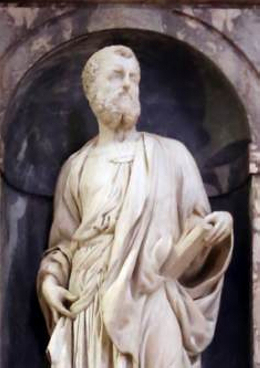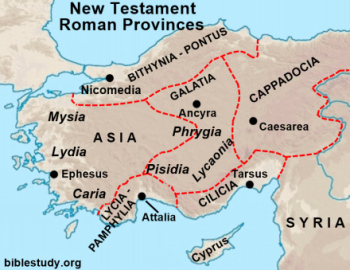Of all the original twelve apostles only two, Peter and John, have their activities recorded in the book of Acts. A man named James, referenced in Acts 15, was not one of the original apostles but was one of Jesus' half-brothers. The death of the Apostle James, the brother of John, is recorded in Acts 12.
[Why Did Jesus' Disciples Leave Him?]
Peter was one of a least four other disciples who had earned a living as a fisherman at the time of his calling. The others were Andrew, James and John (Matthew 4:18 - 22).
Peter is one of only three apostles whose writings appear in the New Testament. The other two are Matthew and John. Peter is also one of eight writers total whose books compose the New Testament. The others are Mark, Luke, Paul, James and Jude.
The first epistle of Peter, like the other General Epistles of James, 1John and 3John, does not open with a greeting from the Godhead (God the Father and Jesus).
Name Dropper
Peter mentions himself in both books he wrote (1 and 2Peter). Contrast this with the Apostle Paul, whose name is mentioned in thirteen of his fourteen writings. The only book he wrote that did not include his name is Hebrews.
John's gospel, out of the four that were written, mentions Peter the most by recording his name 34 times in 31 King James verses. Acts, however, references him more than all others, recording his name 58 times in 56 verses.

Borrowing
The top ten New Testament books that quote the Old Testament the most are Revelation (content from 32 books), followed by Luke (31), John (26), Acts (25) and Mark (24). Rounding out the top ten are Romans (23), Hebrews (21), 1Corinthians (18), James (17) and lastly the book of 1Peter (15).
A Relative Foundation
Peter and Andrew were, surprisingly, not the only set of brothers called by Jesus. The sons of Zebedee, James (the Greater) and John, were also called to be disciples.
[How Does God Honor the
Apostles in the New Jerusalem?]
James the son of Alphaeus (James the Less), Judas brother of James and Simon the Canaanite (Simon the Zealot) were also brothers. This means seven out of the twelve disciples, or 58%, of what would become the foundation of the New Testament church (Revelation 21) had a close relative who was also an apostle.
Names for Jesus
1Peter uses several different phrases to symbolically refer to Jesus Christ. The book's second chapter holds most of the references Peter uses for the Lord.
Verse 4 of 1Peter 2, in the King James, calls Christ a "living stone" (an allusion to Isaiah 28:16) and someone who is "chosen of God." Verse 6 labels him "a chief corner stone" (another allusion to Isaiah 28:16) while verse 8 refers to him as a "stone of stumbling" and a "rock of offense." These last two phrases are a reference to Isaiah 8:14.
Peter, in 1Peter 2:25, calls the Lord "the Shepherd" and "Bishop of your souls." Finally, in 1Peter 5:4, Jesus is called "the Chief Shepherd."
Names for Christians
The first epistle by Peter, especially chapter 2, offers several phrases symbolizing Christians or their responsibilities and status before God.
[What Exactly is a Christian?]
Ye also, as lively stones, are built up a spiritual house, an holy priesthood, to offer up spiritual sacrifices . . . (1Peter 2:5).
But ye are a chosen generation, a royal priesthood, an holy nation, a peculiar people . . . (1Peter 2:9).
Which in time past were not a people, but are now the people of God (1Peter 2:9).
[What Is the Order of Melchizedek?]
In chapter 5 Peter calls Christians God's flock.
Feed the flock of God which is among you, taking the oversight thereof . . . (1Peter 2:10).
Peter Promises
This epistle by Peter has a few precious promises from God. The first one is that a Christian's inheritance is incorruptible and perfectly preserved in heaven. This inheritance will be revealed when Jesus returns to the earth.
To an inheritance incorruptible, and undefiled, and that fadeth not away, reserved in heaven for you, who are kept by the power of God through faith unto salvation ready to be revealed in the last time (1Peter 1:4 - 5).
[The Bible's Greatest Promises!]
The other promises concern Christians receiving glory and being made perfect in character when the Second Coming takes place.
And when the chief Shepherd shall appear, ye shall receive a crown of glory that fadeth not away . . .
But the God of all grace, who hath called us unto his eternal glory by Christ Jesus, after that ye have suffered a while, make you perfect, stablish, strengthen, settle you (1Peter 5:4, 10).
Hope in Trials
One of the major themes in Peter's first epistle is hope (1Peter 1:3, 13, 21, 3:15). That said, the subject of trials, temptations and troubles appears more strongly in the book. Peter acknowledges his readers in Asia Minor, as he opens his epistle, were going through some tough times.
. . . though now for a season, if need be, ye are in heaviness through manifold temptations: that the trial of your faith, being much more precious than of gold that perisheth, though it be tried with fire . . . (1Peter 1:6 - 7).

Peter encourages Christians to live a holy life full of good works. This is so that, after they are unrighteously derided by others, their works will be remembered when their accusers are granted repentance (1Peter 2:12, 4:4).
Peter also commends those who suffer unjustly for the belief in God (1Peter 2:19 - 21, 3:14 - 17). He makes the sobering point that since Jesus suffered for the sake of righteousness we should expect the same to happen to us.
For even hereunto were ye called: because Christ also suffered for us, leaving us an example, that ye should follow his steps (1Peter 2:21).
Beloved, think it not strange concerning the fiery trial which is to try you, as though some strange thing happened unto you: but rejoice, inasmuch as ye are partakers of Christ's sufferings . . . (1Peter 4:12 - 13, see also 4:19).
Peter closes his book by warning Christians to be vigilant since Satan the devil is always looking for people to destroy (1Peter 5:8).
[Different Names for the Devil]
[Why Is the Devil Still Alive?]
Multiple References
The King James New Testament references Peter is several ways other than his simplified short name.
Matthew refers to him as "Simon called Peter" (Matthew 4:18) or Simon Peter (16:16). Jesus called him Simon Barjona (Matthew 16:17), Simon (Matthew 17:25), "Simon the son of Jona" and Cephas (John 1:42), as well as "Simon son of Jonas" (John 21:17). Mark labeled him "Simon surnamed Peter" (Mark 3:16).
An Explosive Relationship?
Saltpeter is another name for the naturally occurring mineral potassium nitrate. This mineral is used in fertilizers, rocket propellants (e.g. fireworks) and gunpowder. The word itself comes from the Medieval Latin sal petrae, which literally means "salt of the rock." Its relationship to Peter is that Jesus used the word for a small stone (small rock, Strong's Concordance #G4074) to reference the apostle in Matthew 16:18.
Petering Out
The slang phrase "petering out" or "peter out" refers to someone who has lost all their energy and is tired out. It can also reference something that is slowly diminished until it finally ends, like water coming out of a hose that slows to a trickle and then stops.
According to Phrase Finder, the earliest use of "to peter out" or "petering" to mean "dwindle to nothing" is in the mid-19th century. They were used, according to the site, in relation to dwindling mining reserves in the United States.
An expansion on the meaning of "to peter out" is found in Everyday Phrases - Their Origins and Meanings. The phrase, according to the book, arose in American goldfields during the first half of the 19th century. Peter's name, which in Greek refers to a small rock, was also used to reference a vein of ore. When a seam had all the gold within it removed it was said to have "petered out."